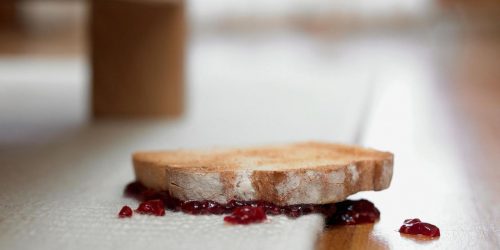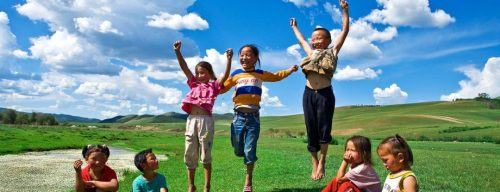Why We Should Let Our Children Get Dirty
When we hear the words dirt and dirty, the first thing that might always come to our mind is germs. We’ve equated getting dirty with contacting harmful microorganisms that we vigilantly keep our kids from it.

source: thesun.co.uk
But one expert says our over vigilance isn’t doing our children well. Here are the reasons why.
Dear parents:
- when we forbid our kids from playing with what we think are dirty toys or germ-laden surrounding like our backyards,
- when we sanitize their hands immediately (like using antiseptic wipes or hand sanitizers) after a romp outdoors, or
- when we don’t allow them to get close to pet animals (or other domesticated ones for that matter), we are doing them more harm than good.
“Dirt’s good,” declared germ expert, scientist, and parent Jack Gilbert. “When we stop our kids from getting in contact with dirt, with the natural environment for fear they’ll contact germs and get sick, we’re over sensitizing their immune systems. We’re only upping the risks of them getting sick this way.”
The Back Story
As a new dad, Gilbert became the recipient of countless, varying (and unasked for) advice about baby care – from how often should a pacifier be sanitized to administering antibiotics and the likes. After his second child was born, the scientist and professor at the University of Chicago decided to find out for himself the truth about germs once and for all.
And through his study, he found out that what parents deem as “dirty and germ-laden” exposures are really beneficial for the children.
“Take the pacifier that fell on the floor,” he said. “Our usual reaction would be to sanitize it before sticking it back to our child’s mouth or getting another clean pacifier. But if we just put the dirty ones in our mouth, give it a good licking before we let our toddler use it again, we’re actually stimulating his immune system. In short, his immune system is going to get stronger because of what we did.”
If we learn early on that we have the wherewithal to get through situations that make us uneasy, anxious, unhappy, angry, etc., we are in a good position to manage our lives. This is learned through repeated encounters with these feelings, the successes and failures of dealing with them, and finally the experience of oneself as competent to manage. — Beverly Amsel, PhD
Gilbert shared his germ knowledge in the book Dirt is Good: The Advantage of Germs for Your Child’s Developing Immune System which he co-authored with another Ph.D.- bearing colleague, Rob Knight.
The said book is in a question-and-answer format and serves as the answer to the seemingly countless questions Gilbert fielded from over-vigilant parents about kids and dirt.
Some of the things discussed in the hardcover are:
The Five-Minute Rule On Foods
This rule’s a myth as it only takes nanoseconds for microorganisms to attach themselves to fallen food. However, eating foods that fell on the floor like cookies or biscuits won’t do anyone – even little kids – harm unless the place it has fallen to is deemed highly contaminated. And it’s most American homes, with our penchant for overcleaning and sterilizing, contamination is not a problem.
The gist? Let your child eat it.
Children need to learn to recognize, trust, and listen to their hunger cues—to eat when they are hungry and stop when they are full. — Megan MacCutcheon, LPC

source: bbc.com
Hand Sanitizer, Anyone?
Gilbert urged parents to stop using hand sanitizers as they’re more dangerous to our kids’ health. Pure soap and water or a basin of warm, soapy water will do when cleaning your child’s hands.
Of Licking Pets
There’s nothing wrong with allowing the kids from interacting with your pets. And the dog licking your child’s face? It’s not a bad thing. Again, it could be beneficial for his health – remarkably.
And Playing Mud Pies
Gilbert urged parents to allow their children to play outdoors a lot longer. And most importantly, don’t freak out when they get dirty after playing with mud or has dirt on their faces. A romp outside strengthens their immune system. In fact, Gilbert revealed that we’re making our kids more prone to getting allergies when we overprotect them from the natural environment.
“When our kids get used to the overclean ways we subject them to, their immune systems go haywire come the time something foreign is introduced, like pollen. When the protective cells go into overdrive, they trigger adverse reactions like asthma, eczema and even food allergies.
Thirty years ago, kids tended to gravitate toward one pastime—usually something they had an affinity for—and stuck with it. We rarely tried our hands at many different sports or arts, and as as result we were less well-rounded. — Vicki Botnick, MA, MS, LMFT
Jack Gilbert left this advice in the end:
“Feed your kids healthy food – more leafy and colorful veggies, more fiber intake and lessen sugar consumption in your household. But most importantly, let your children go out and experience the world. The outdoors is no threat to them. In fact, they’ll get stronger and get more benefits from a romp outside than letting them stay within the over-sanitized bubble that is our homes.”
